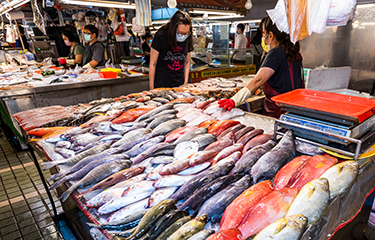Taiwan is threatening to elevate a dispute over a Chinese ban on Taiwanese seafood exports to World Trade Organization arbitration.
Nearly all Taiwan’s seafood exporters have reported their products have been blocked from entering China. Many reported being informed by Chinese Customs they were not in compliance with new labeling laws that came into effect in January 2022. Taiwanese seafood-trading firms were asked to fill out supplementary documentation proving compliance with the laws in August 2022, according to Bloomberg.
Seafood shipments from Taiwan to China totaled 67,087 MT from January through November 2022, with Pacific saury and squid the top species shipped by volume. By value, Taiwan exported around USD 100 million (EUR 94.8) in seafood products to China through November 2022, down from an average of USD 175 (EUR 163) over the past five years.
Taiwan’s Food and Drug Administration said Chinese Customs has not notified it of its reasons for withholding import approvals for all but one of the more than 100 Taiwanese seafood producers and fishing boats which registered themselves under the new Chinese laws by the August 31 deadline. On the Chinese Customs administration’s website, only one Taiwanese seafood firm appears to have been granted approval to export to China, with the others listed with an “imports suspended” status.
China first moved to restrict Taiwanese seafood imports in August 2022, following U.S. House Speaker Nancy Pelosi’s high-profile visit to the island. China maintains the position that Taiwan, or Chinese Taipei, is a breakaway province and should be reunited as part of the People’s Republic of China.
Chinese media and social media figures have blamed Taiwan’s government for the seafood-trading problems. A report broadcast on Xiamen TV, the municipal channel of the mainland city nearest Taiwan, suggested Taiwanese exporters were angry that the Taiwanese Ministry of Agriculture had not informed the island’s seafood exporters of the new requirements in time.
On 11 December, Taiwan Premier Su Tseng-chang accused China of breaking World Trade Organization rules by “meddling in trade through administrative means.”
“Aquatic products were banned without any warning after pineapple, sugar apples, and grouper a while ago,” he said, according to the Japan Times. “[China] is especially tough on Taiwan and especially discriminates against Taiwan.…They’ve asked Taiwan to do this and do that.”
Beijing’s level of compliance with WTO rules was criticized in the 2021 Report to Congress on China’s WTO Compliance, published by the United States Trade Representative (USTR).
In joining the WTO in 2001, China “agreed to embrace the WTO’s open, market-oriented approach” to trade, according to the USTR. But China has a “poor record” when it comes to “complying with WTO rules and observing fundamental principles on which the WTO agreements are based.”
But the report condemned China’s creation of non-trade barriers and a lack of action on intellectual property rights. China remains a non-market economy driven by state intervention, putting other WTO members at a disadvantage, the report said.
Beijing’s fusion of politics and trade is facing scrutiny on several fronts at the WTO. The E.U. is seeking the establishment of a panel at the WTO to adjudicate on what it sees as China’s discrimination against products from Lithuania, after the latter deepened its relations with Taiwan in September 2022. And Australia has taken a case to the WTO regarding China’s ban of Australian imports in 2021. Additionally, China has also faced WTO criticism over bans it placed on foreign seafood companies on the grounds that their shipments were found to be infected by Covid. Beijing said it based the bans on what it said was United Nations Food and Agriculture Organization advice on preventing Covid in the food chain.
China has frequently barred food imports based on sanitary and phytosanitary concerns, such as excessive residues of metals and chemicals. However, its Covid-related bans extended beyond any mandate granted by WTO rules, according to Roy C. Lee, deputy executive director at the Taiwan WTO and RTA Center at the Chung-Hua Institution for Economic Research.
“While WTO rules grant China the right to impose measures necessary to protect human, animal, and plant life, China’s bans do not seem evidence-based or necessary,” Lee said.
Simultaneously, China is taking its own case to the WTO, seeking an adjudication on U.S. controls on semiconductor sales to China.
“In recent years, the U.S. has been generalizing the concept of national security and abusing export control measures,” China’s Commerce Ministry said in a statement, pointing to a recent WTO ruling that found tariffs on steel and aluminum put in place by the administration of former U.S. President Donald Trump violated WTO rules.
Though Sino-U.S. relations have strained in recent years, Beijing and Washington are currently preparing for a visit to China in early 2023 of U.S. Secretary of State Anthony Blinken, the most high-profile visit of a senior U.S. official to China in several years.
Photo courtesy of Jack Hong/Shutterstock







